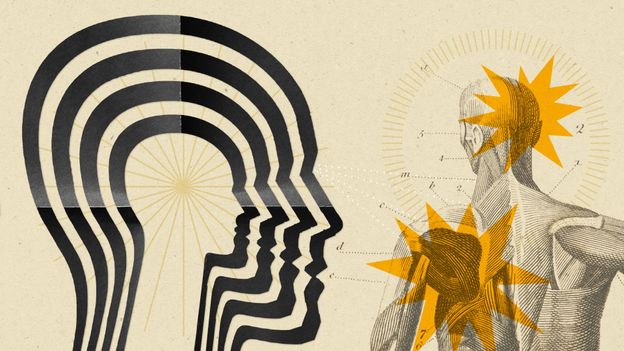   
CEO Picks - The best that international journalism has to offer!
 S33 S33 S1 S1Russia Is Back to the Stalinist Future - Foreign Policy (No paywall)   In 1968, the American scholar Jerome M. Gilison described Soviet elections as a “psychological curiosity”—a ritualized, performative affirmation of the regime rather than a real vote in any sense of the word. These staged elections with their nearly unanimous official results, Gilison wrote, served to isolate non-conformists and weld the people to their regime.In 1968, the American scholar Jerome M. Gilison described Soviet elections as a “psychological curiosity”—a ritualized, performative affirmation of the regime rather than a real vote in any sense of the word. These staged elections with their nearly unanimous official results, Gilison wrote, served to isolate non-conformists and weld the people to their regime.
Continued here
|
 S2 S2Use These Simple Strategies to Retain Everything You Read   Quitting a book is not as easy as it seems. We’ve been taught our whole lives to finish what we start and that anchor prevents us from moving forward. A book we are no longer interested in often sits on our nightstand, serving as a visual reminder of what we need to finish before starting something new. Time filters out what works from what doesn’t. And there is no need to waste time on books that don’t last. Time sorts the books worth reading deeply from the ones that should be skimmed or ignored. Most of what you need from new books (skill development, recipes, etc.) can be found quickly and easily online.
Continued here
|
 S3 S3
 S4 S4Why "Freakonomics" failed to transform economics - The Economist (No paywall)   “Economics is a study of mankind in the ordinary business of life.” So starts Alfred Marshall’s “Principles of Economics”, a 19th-century textbook that helped create the common language economists still use today. Marshall’s contention that economics studies the “ordinary” was not a dig, but a statement of intent. The discipline was to take seriously some of the most urgent questions in human life. How do I pay my bills? What do I do for a living? What happens if I get sick? Will I ever be able to retire?
Continued here
|
 S5 S5The fallacious case for abolishing the rich - The Economist (No paywall)   Luke Hildyard, who runs the High Pay Centre in London and whose book is called “Enough”, stops short of an “absolute cap” but suggests something close to it. No one should earn more than the current threshold for entering the top 1% of taxpayers, he believes. (In Britain that was over £180,000 a year in 2021-22; in America it was about $330,000 in 2021). Redistributing additional income or wealth beyond this point, or enacting policies so that such riches never accrue in the first place, “has no real downsides”, he claims.
Continued here
|
 S6 S6 S7 S7The Link Between Highly Processed Foods and Brain Health   Roughly 60 percent of the calories in the average American diet come from highly processed foods. We’ve known for decades that eating such packaged products — like some breakfast cereals, snack bars, frozen meals and virtually all packaged sweets, among many other things — is linked to unwelcome health outcomes, like an increased risk of diabetes, obesity and even cancer. But more recent studies point to another major downside to these often delicious, always convenient foods: They appear to have a significant impact on our minds, too.In 2009, Brazilian researchers put food on a four-part scale, from unprocessed and minimally processed (like fruits, vegetables, rice and flour) to processed (oils, butter, sugar, dairy products, some canned foods, and smoked meats and fish) and ultraprocessed. “Ultraprocessed foods include ingredients that are rarely used in homemade recipes — such as high-fructose corn syrup, hydrogenated oils, protein isolates and chemical additives” like colors, artificial flavors, sweeteners, emulsifiers and preservatives, said Eurídice Martínez Steele, a researcher in food processing at University of Sao Paulo, Brazil. This classification system is now used widely by nutrition researchers.
Continued here
|
 S8 S8Pacemaker Powered By Light Eliminates Need For Batteries And Allows The Heart To Function More Naturally - Discover Magazine (No paywall)  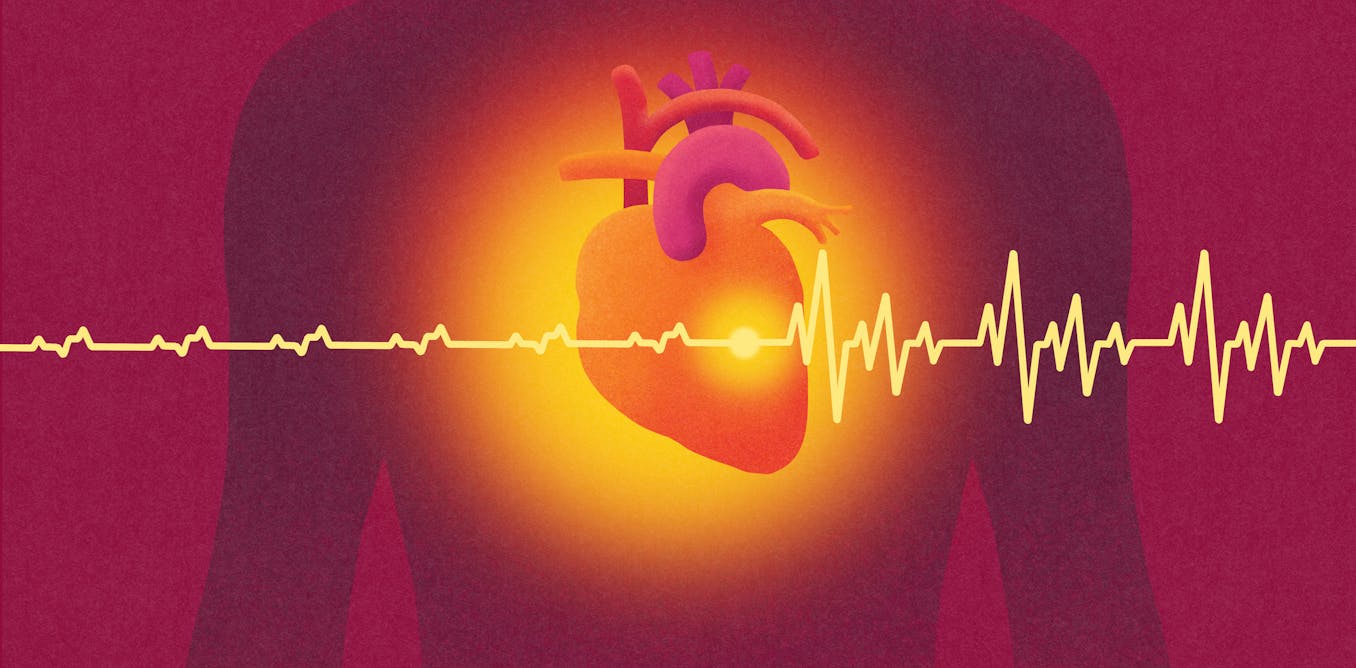 By harnessing light, my colleagues and I designed a wireless, ultrathin pacemaker that operates like a solar panel. This design not only eliminates the need for batteries but also minimizes disruptions to the heart’s natural function by molding to its contours. Our research, recently published in the journal Nature, offers a new approach to treatments that require electrical stimulation, such as heart pacing.Pacemakers are medical devices implanted in the body to regulate heart rhythms. They’re composed of electronic circuits with batteries and leads anchored to the heart muscle to stimulate it. However, leads can fail and damage tissue. The location of the leads can’t be changed once they’re implanted, limiting access to different heart regions. Because pacemakers use rigid, metallic electrodes, they may also damage tissue when restarting the heart after surgery or regulating arrhythmia.
Continued here
|
 S9 S9Top 20 Countries Where Older People Are the Happiest  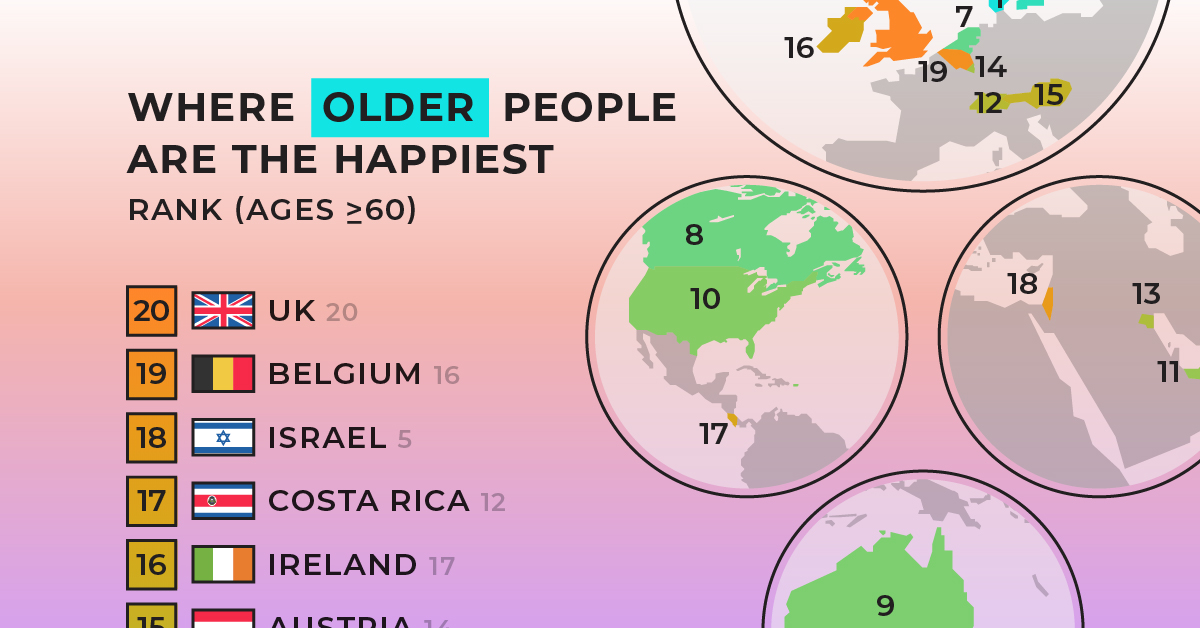 Similarly, China nearly breaks into the top 20 with a population density of 149 people/km². Despite its vast population, the country’s immense size presents a challenge, particularly in its western regions, which are largely inhospitable to substantial human settlement due to the presence of mountains, the Tibetan plateau, and two deserts.
Continued here
|
 S10 S10How AI reduces the world to stereotypes   In July, BuzzFeed posted a list of 195 images of Barbie dolls produced using Midjourney, the popular artificial intelligence image generator. Each doll was supposed to represent a different country: Afghanistan Barbie, Albania Barbie, Algeria Barbie, and so on. The depictions were clearly flawed: Several of the Asian Barbies were light-skinned; Thailand Barbie, Singapore Barbie, and the Philippines Barbie all had blonde hair. Lebanon Barbie posed standing on rubble; Germany Barbie wore military-style clothing. South Sudan Barbie carried a gun.The article — to which BuzzFeed added a disclaimer before taking it down entirely — offered an unintentionally striking example of the biases and stereotypes that proliferate in images produced by the recent wave of generative AI text-to-image systems, such as Midjourney, Dall-E, and Stable Diffusion.
Continued here
|
 S11 S11Why Your Diet Needs More Fermented Pickles  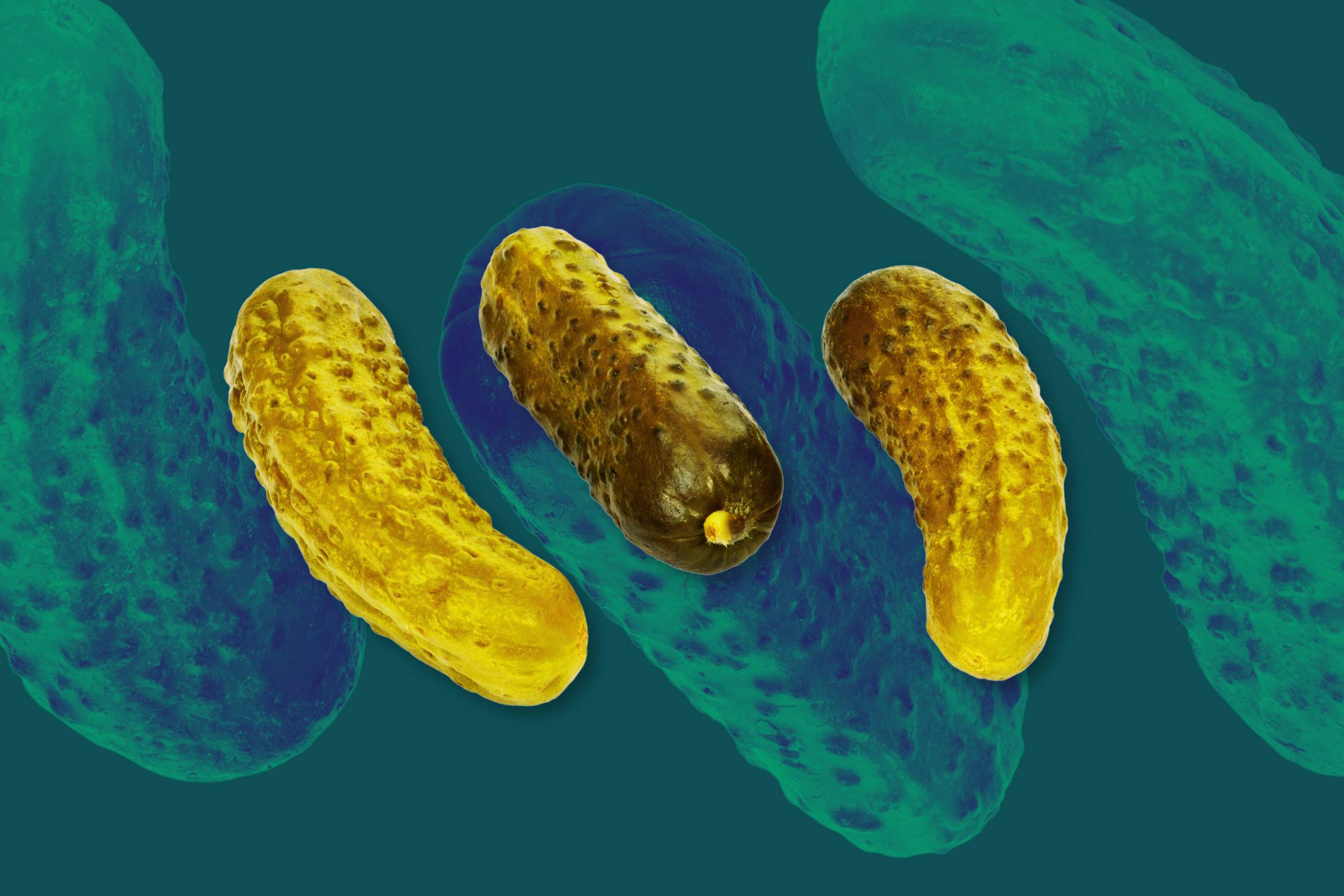 Scientists have made progress in separating fact from fiction when it comes to health claims about pickles: both the cucumber kind, and other types of pickled vegetables. We asked experts how to find the healthiest kinds of pickles, which benefits are backed by research, and the right amount to eat every day.Most of what you find at the grocery store—in both the refrigerated and room-temperature sections—are “quick pickles,” meaning the cucumbers (or other pickled vegetables) are acidified in a vinegar-based broth for no more than a few days. Some of these quick pickles are also heat-processed to make them last longer on store shelves and destroy pathogens that could make people sick.
Continued here
|
 S12 S123 Body Problem, explained with the help of an astrophysicist   Netflix’s 3 Body Problem premiered March 21, and there’s a lot of science! The new Netflix series from screenwriter Alexander Woo and Game of Thrones shepherds David Benioff and D.B. Weiss adapts a bestselling sci-fi trilogy by Chinese writer Liu Cixin, an engineer with a high-level understanding of physics. The story that unfolds over 3 Body and its two sequels, also known as the Remembrance of Earth’s Past series, won acclaim for its vision of a future based on a variety of ideas about quantum mechanics and how they might impact a future interstellar existential crisis. In 3 Body’s fictional universe, far-flung theory plays out in real time in the lives of a far-away alien species and its attempts to both interact with and influence humans here on Earth. Fortunately for audiences who aren’t Einsteins, the Netflix series shifts much of the drama away from the skies and onto humans — it even creates a bunch of entirely new characters to give us people to care about in between all the physics. Liu’s series includes two more books following the first novel; the Netflix series follows the first book, then spins off in its own direction for a while before setting us up for book two. What they both have in common is a zoomed-out view of quantum mechanics and astrophysics underlying all the cool space stuff. Our heroes and villains are all scientists whose decisions and conflicts dictate humanity’s course both now and in the distant future. With the assistance of an actual astrophysicist, let’s go through the basics you need to know to understand what the heck is happening in this show.
Continued here
|
 S13 S13What It Takes to Give Palestinians a Voice - The New Yorker (No paywall)   On the eve of Ramadan, a holy month when observant Muslims fast from sunrise to sunset, Khalil Shikaki was wrapping up an unprecedented poll conducted amid war in Gaza and growing chaos in the West Bank. Shikaki is the director of the Palestinian Center for Policy and Survey Research, an independent research institute in Ramallah. He had deployed dozens of two-person teams inside Gaza, across the West Bank, and in East Jerusalem to track public opinion on war, peace, and politics. Each team had at least one woman, to accommodate religious and cultural sensitivities. A number of monitors each worked with two to three teams, to verify their locations and work. The monitors, in turn, had coördinators, as part of the poll’s quality controls. All of the workers involved carried tablets so that Shikaki, a U.S.-educated political scientist who grew up as a refugee in Gaza, could track their movements and insure their safety from his modest research center in the West Bank. All of them were also on a WhatsApp group chat for alerts about imminent dangers: fighting and bombardments in Gaza, violence between Israeli settlers and Palestinians in the West Bank. The entire population of Gaza faces acute food shortages, with half facing famine, while in the West Bank armed groups are filling the security vacuum amid the political implosion of the Palestinian Authority.The poll is an attempt to understand what Palestinians think about the future—just as Shikaki’s first poll, in 1993, was a barometer of their attitudes about the historic Oslo Accords, when Israel and the Palestine Liberation Organization recognized each other after three decades of sporadic conflicts. He had been part of back-channel talks between Israelis and Palestinians, in London, in the run-up to the Accords. “On the day that the Oslo agreement was signed, on the White House lawn, we released our first survey,” he recounted when I visited his office, years later. “We asked whether people supported or opposed the plan. Two-thirds supported it.”
Continued here
|
 S14 S14The Angst Behind China's 'Lying Flat' Youth - The Atlantic (No paywall)   On Halloween in 2022, outside a party the police had just disbanded in Beijing’s warehouse district, I saw a 20-something woman in a sparkly spandex suit and bunny ears run into the road. “Freedom, not testing!” she shouted. “Reform, not revolution! Votes, not dictators! Citizens, not slaves!”Those were familiar words at Tsinghua University, where I was studying for a master’s degree. From a bridge near campus, someone had hung a banner emblazoned with the slogans. The banner’s maker, who became known as “Bridgeman,” had disappeared a few days before Halloween. Now the girl in the spandex suit struggled with her boyfriend in the street as he tried to cover her mouth. The other young people streamed out of the warehouse party in silence. But, moments later, muted voices rose from the crowd: “I agree,” “I support you,” and even, “Xi Jinping has a small penis!”
Continued here
|
 S15 S15 S16 S16 S17 S17This startup wants to fight growing global dengue outbreaks with drones - MIT Technology Review (No paywall)  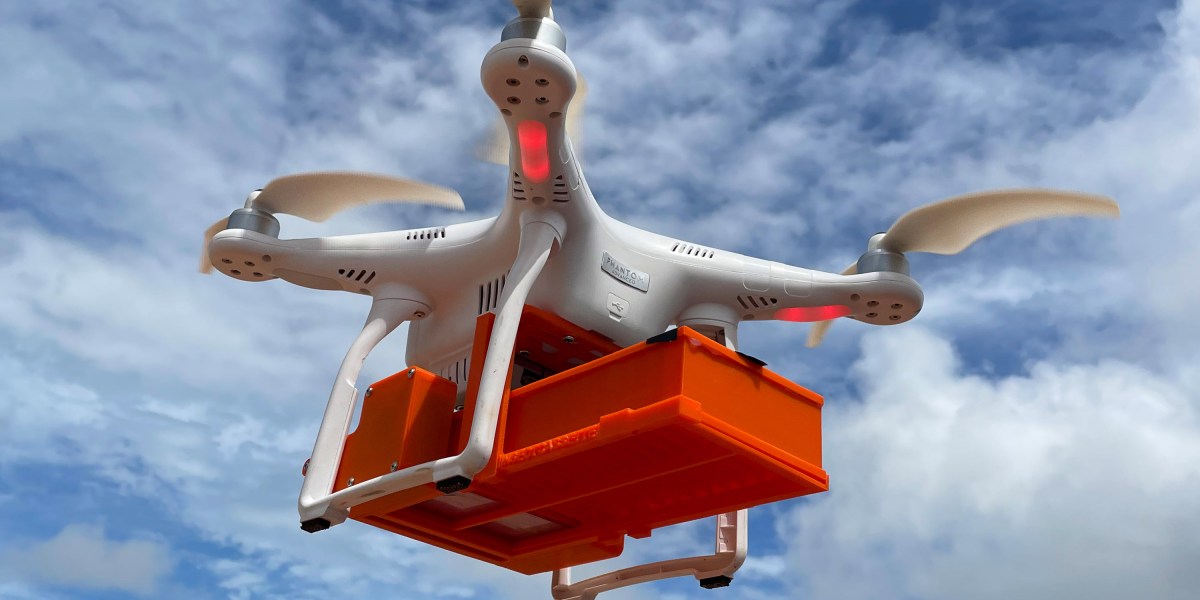 The scientists were releasing sterile males of the species into communities with high instances of the diseases to mate with females already in the region. It’s a measure intended to curb the females’ reproductive potential, thus leading to fewer mosquitos being born, and ultimately cutting the number of cases of mosquito-borne diseases.At the time, researchers walked or drove through affected neighborhoods, carrying canisters of sterile males and releasing them into areas that they knew were breeding grounds for mosquitoes. But there was one hurdle they couldn’t overcome: getting into the nooks and crannies of the neighborhoods where stagnant water often collects—the pool in an abandoned backyard, the tires out back at the local mechanic’s shop, the plant pots left at cemeteries.
Continued here
|
 S18 S18Neurology professor Lisa Mosconi: 'Menopause is a renovation project on the brain'  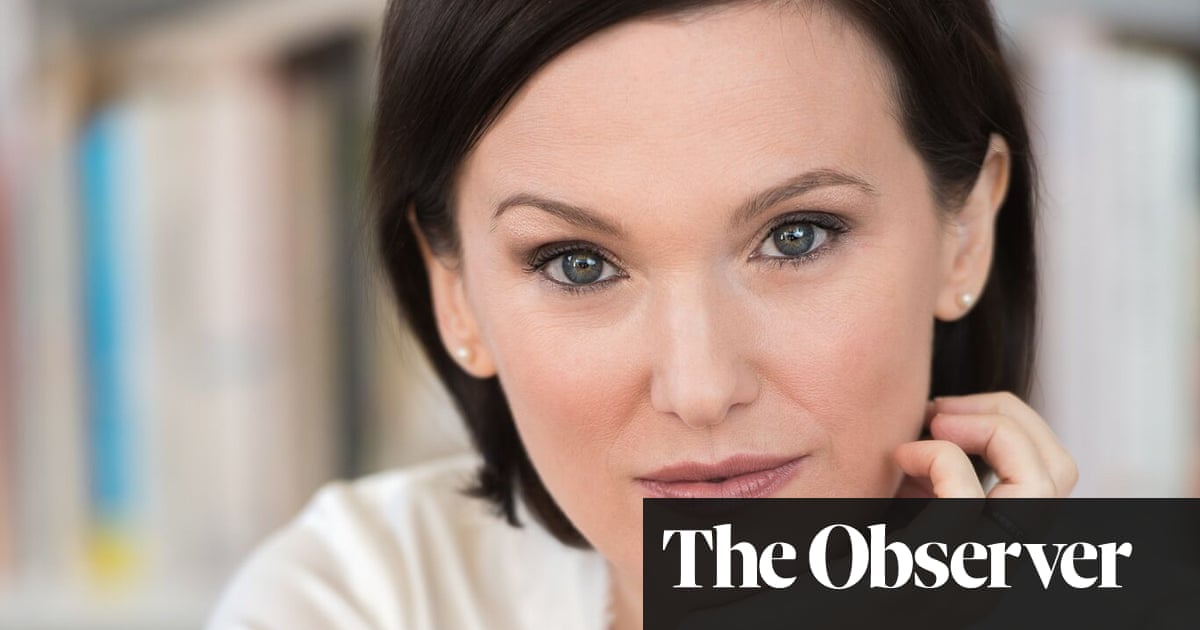 Menopause is a hot topic! What does your book bring that is new?A neuroscience perspective. And it is a part of menopause that's been excluded or not acknowledged clearly. While hot flashes are generally recognised as a side-effect of menopause, most doctors simply won't make the connection with other brain symptoms. But our ovaries are in direct communication with our brain, which is hardwired to respond to the oestrogen and other hormones they produce. And while our ovaries close up shop, our brain needs to keep going. That can bring glitches as our brain adjusts. I am here to say: you're not crazy!What are the main brain symptoms that women experience? And what is going on to give rise to them?Common brain symptoms, in addition to hot flashes and night sweats, include sleep difficulties, low mood, low libido, low energy and cognitive issues like brain fog. Brain-related symptoms seem to occur with greatest intensity during late perimenopause (when periods are skipped for more than six months at a time) and early postmenopause.
Continued here
|
 S19 S19How the discovery of dinosaur fossils caused a revolution - The Economist (No paywall)   AN intellectual revolution began in 1811 when Mary Anning, a 12-year-old living in Lyme Regis, a harbour town in south-west England, excavated the first fossil of a marine reptile, the Ichthyosaurus. It culminated in 1881 with the opening of the Natural History Museum in London, imperial capital of the world, by Richard Owen. Those seven decades spanned a change in thinking as profound as that triggered by the astronomers of the late Renaissance—and as disturbing to the established church. (In this case, the threatened church was that of England, not Rome.) Fossils sparked a revelation of biblical proportions: God had not created the world in six days a few thousand years before, as so many believed.
Continued here
|
 S20 S20The war in Gaza may topple Hamas without making Israel safer - The Economist (No paywall)   “I WISH I could say we have a very detailed plan,” an Israeli army officer admitted to your correspondent in the chaotic days following Hamas’s brutal assault on southern Israel on October 7th. More than 1,100 people had been killed; some 240 had been dragged back to Gaza as hostages. It was clear from the outset of the war in Gaza, now six months old, that Israel’s two main goals—to eliminate Hamas and to free the hostages—were at odds. It was also clear that invading the territory, in which 2.2m people live cheek by jowl and under which Hamas had built a labyrinth of fortified tunnels to help it withstand an attack, was going to be immensely difficult. And there was always the risk that war in Gaza would spiral into a bigger conflict.
Continued here
|
 S21 S21What a Breast Cancer Risk Calculator Can and Can't Tell You   There are two main calculators: the Breast Cancer Risk Assessment Tool, also known as the Gail model, and the Tyrer-Cuzick Risk Assessment Calculator, also called the IBIS model. Both ask users their age, race, ethnicity, family history of breast cancer, when they first started their periods, and, if they have children, how old they were when they had their first child. All of these factors can influence a person’s risk of breast cancer.
Continued here
|
 S22 S22Your Questions About Sodium, Answered   In a 2021 review of 85 clinical trials, for example, scientists looked at what happened to people’s blood pressure when they consumed 400 to 7,600 milligrams of sodium per day. As their consumption increased, the researchers reported, so did their blood pressure. The effect was strongest for people who already had high blood pressure, but the researchers also saw it in people who didn’t.
Continued here
|
 S23 S23The Ideal Dog Name, According to Science, Is Not What You Think   A friend of mine recently adopted her first dog. A Star Wars fan, she picked the name Leia. When she told others about her new princess, she was surprised to receive some pushback on the name. Is that true? Are there names that animals respond to best? In other words, is there an ideal name for a pet?There’s some conventional wisdom floating around the internet regarding naming practices. The Kennel Club, for example, recommends two-syllable names that end in a vowel. Rover also recommends keeping things short. One veterinary behaviorist told the site that dogs respond more quickly to “short, choppy” sounds rather than “long, slow, soothing” ones, offering that the name Huck trumps Huckleberry Finn.
Continued here
|
 |
TradeBriefs Publications are read by over 10,00,000 Industry Executives About Us | Advertise Privacy Policy Unsubscribe (one-click) You are receiving this mail because of your subscription with TradeBriefs.
Our mailing address is GF 25/39, West Patel Nagar, New Delhi 110008, India |































































